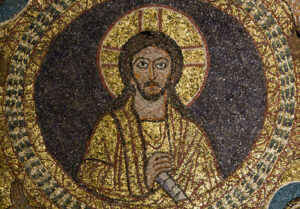Against Christian Nationalism on Easter (and beyond)
Lucas Kwong | April 10, 2020
Donald Trump wants the churches, and the economy, to open on Easter Sunday. That he has officially disowned these ambitions is, to some extent, irrelevant in the world he has helped create. His halfhearted walkback of an anti-scientific proposal (like his non-apology for the term “Chinese virus”) plays as a covert wink to his diehard disciples; the Trump-supporting pastors refusing to cancel services show that they’ve received the message loud and clear. Beyond the more exotically charismatic variety of Trumpists, though, Wall Street Journal-reading Calvinists and graduates of tony Catholic schools everywhere will also surely thrill to the Trump gospel of “American resurrection” and “economic resurrection.” Even as their better angels move them to livestream instead, they will dwell upon their leader’s piety, and rejoice. Fatherland, strongman, invisible hand: in effect if not in intent, Christian nationalists have made an idol of this perverse trinity, no matter how eloquently they might extol the bonds of Father, Son, and Holy Ghost.
The point of Trump’s statement is not necessarily to pack the churches, but rather to train his followers to accept the Resurrection’s reduction to mere metaphor: a symbol for an economic surge, liberty’s restoration, Trump’s second term. To attend Easter service is to revive the economy, and to revive the economy is to revive America itself, and to revive America is the exclusive prerogative of America’s own King Cyrus. This is a ghastly offense to our “Easter hope” and a death sentence for the market’s unworthy victims. Transparently sinister though this strategy may seem, it is working, and we can expect Trump to continue promising empty religious spectacle to a nation reeling from a pandemic, on the cusp of a general election. Unless we want the self-appointed warriors for Christ to continue equating Christianity with Trumpist conservatism, now is the time for the religious left to issue a full-throated challenge to Christian nationalism. But how to understand its hold on Pentecostals, Tridentine traditionalists, Presbyterians, and above all, Evangelicals?
Charismatics, Intellectuals, and the Righteous “Racket Society”
A wave of recent scholarship illuminates the calculus behind Trump’s Easter speculation, as well as the likelihood of its success. Andrew Whitehead and Samuel Perry’s Taking America Back For God uses data from thousands of survey interviews to construct a portrait of rank-and-file conservative voters, who are grappling with renewed attempts to defend America’s mythical “Christian heritage.” Whitehead and Perry divide this motley movement into “Ambassadors,” unabashed exponents of Christian nationalism, and “Accommodators,” who lean towards Ambassadors’ zealotry without fully embracing it. Acknowledging that the power of the “Ambassadors” has waxed and waned throughout American history, Whitehead and Perry argue that their influence is on the rise again, to be countered by “Resisters” (who harbor qualified objections to theocracy) and “Rejectors” (who oppose it totally). Meanwhile, in her book The Power Worshippers, Katherine Stewart examines the coalition of theologians, billionaires, pastors, and elected officials looking to remake America as an explicitly theocratic polity. Her analysis of Christian nationalists’ anti-science response to the coronavirus highlights their outsized impact on politics, while her study of their access to “enormous troves of [voters’] demographic data” signals the influence they will exert in November.
Stewart distinguishes ideologues from financiers, while Whitehead and Perry distinguish Ambassadors from Accommodators. However, the Easter incident brings into focus a third polarity through which the movement can be understood. On one hand, the flagrantly superstitious charismatic faction took the opportunity to affirm Trump’s Messianic status, with “intercessor” Wanda Alger claiming that only “demonic robot rats” forced him to reverse a “prophetic” call to open churches. Alger’s fixation with demonic influence typifies the “Seven Mountains” dominionism of this segment of Trump supporters, who see themselves as engaged in an end-times battle with Satan for total domination of government, media, and the other “mountains” of society. Texas Lieutenant Governor Dan Patrick, who affirmed Trump’s Easter statement and suggested that the elderly should sacrifice for the economy, is only one of dominionism’s many advocates in government.
On the other hand, the more genteel and intellectually ambitious conservatism represented by Eric Metaxas, Mark Bauerlein, The Federalist, First Things, and Attorney General Bill Barr prefers bombastic pontification over sci-fi-inflected visions (think of the early progenitor of this bloc, William F. Buckley, Jr., insisting that conservatives stand “athwart history, yelling Stop”). This faction may not literally show up in church this Sunday, and it may not even bother to directly defend Trump’s original statement. It will, however, go to bat for that statement’s underlying premise, insisting that prohibitions on church services illustrate the corruption of unnamed “public officials” who “allow unlimited numbers of people to congregate at grocery stores while either banning or strictly limiting public access to … the most important food that can ever exist.” Obsessed with combating “cultural nihilism” and its ruthless deconstruction of social and moral order, figureheads of this wing such as R. R. Reno lament “death’s dominion” over a nation of fearful materialists. Though nationalists like Reno have been measured about their overt support for Trump, they affirm him as the answer to the nation’s ills, the one man leading the charge against the God-hating progressivism they abhor.
These factions might privately disdain one another. They may play at reproducing familiar divisions between Protestant and Catholic, libertarian and authoritarian, factory floor and ivory tower. Nonetheless, they are united in a fundamental contempt for mass democracy, pluralism, leveling of social hierarchies and, by extension, the egalitarianism at the heart of Christianity. Though quite disparate in terms of their origins, emphases, and social class, they each perform a symbiotic role in clearing space for Trump’s antics and his accelerating far-right political agenda. And as the symbolic politics of Never Trumpers wanes in influence, the dialectical partnership between Ambassadors and Accommodators increasingly clears the way for Christian nationalism’s advancement.
In place of liberalism, multiculturalism and social democracy, that advancement would aim at a dominionism predicated on devotion to a king-figure, who beats back the forces of Communism, post-Sixties libertinism, liberation movements, affirmative action, Satan, the Antichrist… and so on. Indifferent to swipes at their leader’s concupiscence and avarice, Trump’s flock exemplifies the “racket society” that Martin Jay recently invoked in his analysis of contemporary society: as Jay argues, the Frankfurt School’s vision of “transactional and concrete relationships between patrons and clients” has finally supplanted the liberal state. In Christian nationalism’s naked quest for preferential treatment, one glimpses the racket society’s triumph over early attempts of Christian leaders to appeals to civility, fair play and universal moral norms against nationalism.
The Ruling Class Gospel and Its Threat to the Left
Needless to say, such a climate bodes ill for radical, leftist politics. Indeed, given illiberalism’s worldwide acceleration, a theology of what Jay calls “obedience to the most plausible protector” threatens radical politics on an international scale. The market-nation-strongman trinity shadows not only Trump’s gaudy piety, but also Viktor Orban’s seizure of emergency powers, Jair Bolsonaro’s exemption of churches from lockdown, Vladimir Putin’s constitutional reboot, and countless other Christian soldiers exploiting COVID-19 to direct resources and privileges to their devout base. (The recent $2 trillion stimulus package allows the U.S. federal government to pay pastors directly.) This international coalition of God-fearing authoritarians has no scruples about using the crisis to punish its enemies and exalt its supporters.
In response to Christian nationalism’s ascendancy, some devout liberal and moderate Christian progressives have recently offered some resistance. Christians Against Christian Nationalism, an initiative of the Baptist Joint Committee For Religious Liberty, launched last year, broadly condemning any “political ideology that seeks to merge Christian and American identities.” Getting somewhat more specific, the Board of the Directors of the International Bonhoeffer Society released a statement in January, flatly calling for an end to Trump’s presidency. In the same month, the Global Center for Religious Research issued their “Open Letter,” which calls for a “mass movement of Christians of good conscience, repudiating in one voice the corruption of evangelical leaders and their institutions.”
However, these initiatives lack a clear strategy for building political power, nor do they speak to a large base of organized Christians capable of swinging conservatives. Amidst a crisis that has birthed a recession (and now likely a depression), bold statements and strongly worded moral condemnations will not be enough to counter the siren song of Trump’s gospel. Large evangelical megachurches, conservative by default and constituted by alienated workers, are already breeding grounds for the spread of Christian nationalism, in both its charismatic and sophisticated manifestations. To borrow Whitehead’s and Perry’s terminology, we can expect them to either accommodate, or produce ambassadors for, Trump’s ever more outlandish attempts to court Christians in a panic-stricken election year.
And even if more mainstream evangelicals do not preach Trumpism from the pulpit, their “both sides” approach will not halt its influence. Such churches are unlikely to dissuade nationalist-curious congregants browsing BrioTV’s Spirit-filled conspiracy theorizing, or PragerU’s pseudo-historiographic paeans to “Judeo-Christian civilization.” For examples of this ineffectiveness, one can look to prominent leaders like Tim Keller and Russell Moore and their predilection for subtweeting nonspecific remonstrations against “nationalism,” while also ritualistically chiding progressives for being “just as bad.” This sort of abstract apoliticism exhibits the same non-confrontational approach that assured Trump’s election in 2016. Amidst a pandemic in 2020, it will hardly mount a challenge to his reelection.
The Christian left—that is, believers who are not merely anti-theocratic, but pro-socialist and pro-labor—should be particularly alarmed by their co-religionists’ apocalyptically inflected Trump worship. The left’s attention has been understandably focused on the outrageously unfair stimulus bill, the Democratic Party’s recently concluded efforts to stop Bernie Sanders by any means necessary, and neoliberals’ blatant attacks on workers, the elderly, and the immunocompromised. While Christian socialists cannot slack on these issues, we also cannot hope to break capitalism’s grip on the poor and working class unless we challenge the theology enveloping it in a shroud of mystification. We should remember that one of the planks of American Christian nationalism, like many other nationalisms, is the belief that the poor deserve nothing from government—morally edifying hardship, after all, is part of what makes America great. We should remember, too, that while the cult of capital attracts devotees on both sides of the aisle, at this stage, it is overwhelmingly fueled by a movement that hails a predatory real estate developer as the last hope of preserving its sacred heritage. Christian nationalism is, in short, a theology of and for the ruling class.
A Material Challenge to Pilate
A second Trump term would metastasize this theology’s power over American evangelicals, multiplying its zealots and growing its enablers. Absent a substantive, material challenge, our opponents will ratchet up attacks on the Christian left as “SJW” heretics, the aberrant counterpart to the genuine faith preserved on the right. Indeed, a chilling sign of the future may come from Hungary, where religious resistance to Orban’s vision of “Christian liberty” is hampered not only by his acolytes, but also with congregants haunted by memories of Soviet religious repression. In vicar Alexander Faludy’s words, “At best, the churches have chosen quietism over prophetic vocation.” Easter is as good a time as any to choose the latter. So what might such an organized response in America look like?
Rather than grounding politics in subtweets and statements, the Christian left needs to consider organizing direct action against Christian nationalist strongholds. For example, churches across America regularly pay royalties to California’s Bethel Church for use of its popular worship songs; the music wing of Bethel’s multimillion dollar operation fuels its efforts to install Seven Mountains warriors in office. Similar to boycotts of unethical corporations, pressure campaigns could choke off revenue and membership from ministries providing financial or ideological support to Trump’s holy warriors. To build that pressure, however, the religious and Christian left must not only mobilize those who already oppose Christian nationalism, but do the hard work of engaging and organizing those whom Whitehead and Perry dub Accommodators and Resisters: parents, siblings, one-time Sunday school teachers, and former youth group acquaintances who exhibit varying degrees of persuadability.
Rather than shaming these people, we can use Trump’s exploitation of Christianity’s holiest day as a potent wedge with which to activate and organize them. In charismatic terms, his Easter comments expose him as a false teacher akin to antichrist, obsessed with appearances of piety and fake miracles, meanwhile burdening the people with heavy loads. What is his prediction of a “beautiful” turnaround if not a false prophecy, to be met with the censure afforded all false prophets? In terms favored by intellectualists, his investment in his curated personality cult exhibits some of the worst aspects of the totalitarian systems that Buckleyesque conservatives abhor. Only by attacking Christian nationalism on such grounds can we avoid triggering conservatives’ persecution complex, and instead recast the movement’s ambassadors as the real persecutors of Christ’s impoverished body. Doing so opens an opportunity to articulate the good news of liberation and solidarity.
2000 years ago, a Roman governor exploited a tradition of state support for a religious holiday, using it as an excuse to abdicate moral responsibility and shore up his polls in one fell swoop. During this election cycle and beyond, the Christian left must relentlessly expose Trump as a Pilate, and the cult of nation for which he stands a form of imperial worship, amongst charismatic enthusiasts and conservative intellectuals alike. We must show how a Christian nationalism that apes populism, while crushing its actual incarnation, weakens spirit, mind and body. We can proclaim the true message of Easter: the crucified victim, not the powerful victimizer, is lord. We know how the story ends.
Lucas Kwong is a writer, musician, and assistant professor of English at New York City College of Technology. He’s written at eschatontwist.substack.com, Journal of Narrative Theory, and Victorian Literature and Culture. He is also assistant editor for New American Notes Online, an interdisciplinary academic journal. He makes music at brotherkmusic.com and tweets at @brotherkmusic.
◆ ◆ ◆
Did you appreciate this article? Please consider making a donation to help us continue to build a new voice for the Chistian Left. Click here to donate today.



